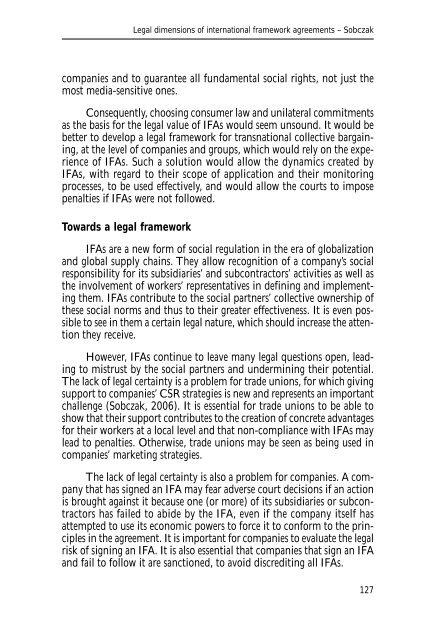CROSS-BORDER SOCIAL DIALOGUE AND AGREEMENTS: An ...
CROSS-BORDER SOCIAL DIALOGUE AND AGREEMENTS: An ...
CROSS-BORDER SOCIAL DIALOGUE AND AGREEMENTS: An ...
Create successful ePaper yourself
Turn your PDF publications into a flip-book with our unique Google optimized e-Paper software.
Legal dimensions of international framework agreements – Sobczak<br />
companies and to guarantee all fundamental social rights, not just the<br />
most media-sensitive ones.<br />
Consequently, choosing consumer law and unilateral commitments<br />
as the basis for the legal value of IFAs would seem unsound. It would be<br />
better to develop a legal framework for transnational collective bargaining,<br />
at the level of companies and groups, which would rely on the experience<br />
of IFAs. Such a solution would allow the dynamics created by<br />
IFAs, with regard to their scope of application and their monitoring<br />
processes, to be used effectively, and would allow the courts to impose<br />
penalties if IFAs were not followed.<br />
Towards a legal framework<br />
IFAs are a new form of social regulation in the era of globalization<br />
and global supply chains. They allow recognition of a company’s social<br />
responsibility for its subsidiaries’ and subcontractors’ activities as well as<br />
the involvement of workers’ representatives in defining and implementing<br />
them. IFAs contribute to the social partners’ collective ownership of<br />
these social norms and thus to their greater effectiveness. It is even possible<br />
to see in them a certain legal nature, which should increase the attention<br />
they receive.<br />
However, IFAs continue to leave many legal questions open, leading<br />
to mistrust by the social partners and undermining their potential.<br />
The lack of legal certainty is a problem for trade unions, for which giving<br />
support to companies’ CSR strategies is new and represents an important<br />
challenge (Sobczak, 2006). It is essential for trade unions to be able to<br />
show that their support contributes to the creation of concrete advantages<br />
for their workers at a local level and that non-compliance with IFAs may<br />
lead to penalties. Otherwise, trade unions may be seen as being used in<br />
companies’ marketing strategies.<br />
The lack of legal certainty is also a problem for companies. A company<br />
that has signed an IFA may fear adverse court decisions if an action<br />
is brought against it because one (or more) of its subsidiaries or subcontractors<br />
has failed to abide by the IFA, even if the company itself has<br />
attempted to use its economic powers to force it to conform to the principles<br />
in the agreement. It is important for companies to evaluate the legal<br />
risk of signing an IFA. It is also essential that companies that sign an IFA<br />
and fail to follow it are sanctioned, to avoid discrediting all IFAs.<br />
127
















